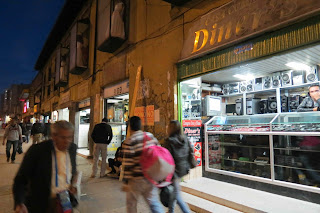 |
| Leidy Garzon and Gonzalo Bonilla Fuentes, owners of military supply stores who fear being forced to sell and move out. |
 |
| 'The center is not for sale! Defend the Center!' A woman walks past a military supply store. |
For more than 40 years, Gonzalo Bonillo Fuentes has sold military gear in this neighborhood between the Plaza Bolivar, Palacio de Nariño and Carrera Decima. Around the corner, Leidy Garzon's family has manufactured and sold boots for two decades. Now they, along with other military supplies vendors, typographers and pawnshops, are facing eviction by the government, supposedly to make room for ministries.
"More than 5,000 people work in this neighborhood, and we're going to be thrown into the street!" protests Garzon, who is president of the neighborhood's association, 'The Committee in Defense of the Center'. "They want to finish off the small businesses. How will we survive?"
The business owners says that the government has offered them only a pittance of their properties' market value. And, if their businesses were relocated, customers would not know how to find them in a new neighborhood. And they doubt that the area would be used for ministries, suspecting instead that the government will bulldoze the buildings, sell to other businesses and make a big profit.
Locals learned of the government's plans thru a letter in May, which adds a sense of fultility to injury by specifying that 'no legal measures may be taken against this announcement'. If property owners do not sell at the government's prices, they say, they've been told their properties will be expropriated.
The neighborhood is run-down, with sagging balconies and walls missing patches of paint. (Business owners complain thatthey aren't allowed to repair their properties because of historic landmark designations.)
The threat to their livelihoods seems to have generated a new political and class consciousness among the business owners, who are mostly people of modest means. They brand the government's plans 'communism' and 'Chavism', like anti-business policies imposed by the government of Venezuela. And they're full of resentment against hight government officials, who earn generous salaries and benefits, such as free transport.
 In fact, it doesn't seem clear to me why the government would want to relocate ministries here. several already located just blocks away, where they function well (or poorly) enough, depending on your point of view.
In fact, it doesn't seem clear to me why the government would want to relocate ministries here. several already located just blocks away, where they function well (or poorly) enough, depending on your point of view.
And central Bogotá abounds with empty lots and vacant buildings which badly need occupation, including the grand, old and vacant Cundinamarca government building on Jimenez Ave. just below La Septima.
Government officials, particularly city leaders, have said they want to reinject life into the city center. Government districts, which become ghost towns after 6 p.m., are not the answer to that.
And, how likely is it that the locals will be forced out only to see the renovation plans stall? That's happened to at least two nearby projects.
 |
| A map showing the blocks to be 'renovated.' |
 |
| Gonzalo Bonilla Fuentes in his shop. He's been here for 25 years and in the neighorhood for 46, and says the government's offered to pay him only a fraction of his property's value. |
 |
| This parking lot and adjoining vacant building might make a good spot for a ministry. |
 |
| Pawnshops on Carrera 10 would also have to sell. |

 |
| A 60-year-old printing machine, still at work in a neighborhood typography shop. |
 |
| Activists post signs declaring 'The center is not for sale.' |
 |
| A sexy soldier. The military supply stores sell to military high schools, security firms and the occasional soldier or police officer. |
 |
| 'Wake up! Respond! This neighborhood is worth gold!' |
 |
| Peeling paint. With grand old buildings, the neighborhood has seen better days. |
By Mike Ceaser, of Bogotá Bike Tours









No comments:
Post a Comment